One of the Best Hotels in Tripoli Uses the Historical Past to Help Create a New Future for Tourism
Libya Top Stories
Al Waddan Hotel: Tripoli uses the historical past to help create a new future
“Europeans would find no better place only an hour or an hour and a half away to come to than Libya. The ruins that we have, both Greek and Roman, are untouched and beautiful. There are so many things to visit; I really do think that within the next 5 to 10 years Libya will be a hot spot for tourism in the world.”
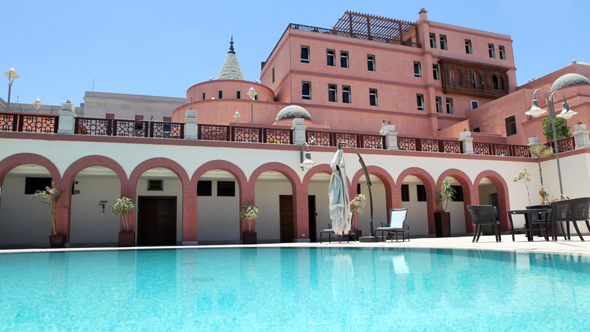
Al Waddan Hotel: Tripoli uses the historical past to help create a new future
Currently there are a large numbers of business travellers visiting Tripoli, involved in government consulting and contracts for infrastructure and natural resources. So many that it is often difficult to find a hotel room.
According to Anas M. Tarsin, the General Manager at Al Waddan Hotel – the oldest and one of the best hotels in Libya, “Europeans would find no better place only an hour or an hour and a half away to come to than Libya. The ruins that we have, both Greek and Roman, are untouched and beautiful. There are so many things to visit; I really do think that within the next 5 to 10 years Libya will be a hot spot for tourism in the world.”
“When it comes to the history of Libya, we should know that this country enjoys the biggest museum of arts in the world, which goes back to 10,000 years B.C.”
With the economy predicted to grow by 19% in 2013 – one of the highest growth rates in the world – coupled with the largest oil reserves in Africa, Libya is being considered the most promising emerging destination for foreign investment. The record attendance for this year’s major trade shows and such as OIL & GAS LIBYA 2013 and INFRASTRUCTURE & CONSTRUCTION LIBYA SUMMIT 2013 holds testimony to renewed interest from the international community in Libya.
According to Mahmoud Jibril, President of Libya’s National Forces Alliance and Former Prime Minister, Libya is facing a massive infrastructure ‘to do’ list with the estimated cost of necessary reconstruction at around US $400 billion.
In 2013, Tripoli announced a record budget of US $51.2 billion. A huge US $15 billion will be spent on development and reconstruction projects in the current year.
Tripoli is a city which has seen many changes, inhabited since the 7th century BC, it holds the archaeological treasures of different empires who once ruled the city. 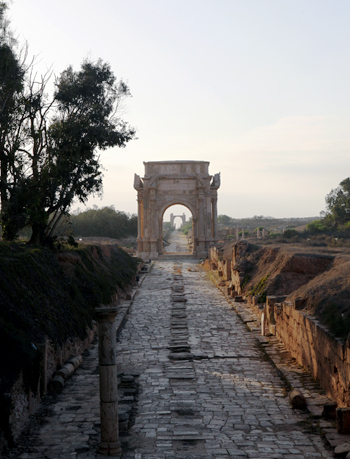 The revolution of 2011 and end of the Gaddafi regime has been another turning point in the country’s history, and as soon as security and infrastructure are fully restored it is hoped that Libya, and Tripoli, will fulfil their great potential.
The revolution of 2011 and end of the Gaddafi regime has been another turning point in the country’s history, and as soon as security and infrastructure are fully restored it is hoped that Libya, and Tripoli, will fulfil their great potential.
History of Libya
According to Habib Al-Amin, Minister of Culture, “When it comes to the history of Libya, we should know that this country enjoys the biggest museum of arts in the world, which goes back to 10,000 years B.C. Especially when we talk about the stone drawings found in the caves in the south of the desert in Libya, which are considered our oldest stone drawings, dating further into history than the ones found Altamira cave in Spain.”
“The most important specialists in the science of history and archaeology say that the beginning of the Egyptian civilization is credited to Libya, and that includes the art of mummification, since the oldest mummy in the world had been found in Libya,” adds Al-Amin.
Libya is home to one of the oldest pyramids in the world. Al-Amin explains “Even when we talk about the Egyptian pyramids, it is known that older examples of such pyramids were found in Libya. The Libyan kings also reached and ruled Egypt. Even Khufu was married to a Libyan. Libya was also mentioned in Torah and in the ancient Greek epic poems like the Iliad and the Odyssey. It was spoken about by historians like Homer and Herod. The first Bible was written in Libya’s mountain by Saint Mark who was born and lived in Libya.”
Explaining the modern history of Libya, Al-Amin explains: “During the Italian time of occupation which was a time of war, 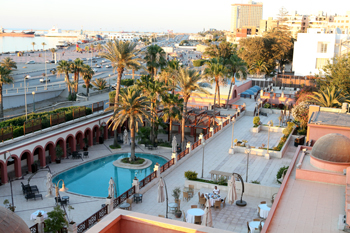 we could still find great Libyan names who came forth with great writings of history and poetry. The Kingdom of Libya during the modern age witnessed a big cultural boom. Yet all of that collapsed after Libya was seized in the reign of darkness by al-Gaddafi, the fallen tyrant. The culture back then was crushed, but Libyan intellectuals were surviving even during that time.”
we could still find great Libyan names who came forth with great writings of history and poetry. The Kingdom of Libya during the modern age witnessed a big cultural boom. Yet all of that collapsed after Libya was seized in the reign of darkness by al-Gaddafi, the fallen tyrant. The culture back then was crushed, but Libyan intellectuals were surviving even during that time.”
Modern Hotel Industry and Tourism Sector
During the Gaddafi years, the hotel industry was monopolised and the number of 4 and 5 star business hotels limited in order to monitor foreign visitors. But now the current Ministry of Tourism has big plans to expand the luxury hotel sector, with many well-known hotel groups looking at Tripoli as a good future investment.
“I think there will be a domino effect where you will see many international hotels and companies coming back,” says Anas M. Tarsin, the General Manager at Al Waddan Hotel, the oldest and one of the best hotels in Libya. Built in Tripoli in the 1930’s it has been recently restored to its former luxury, maintaining the tradition and quality of service of this unique hotel.
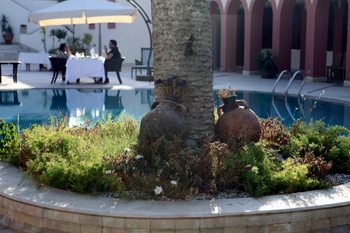 Mr Tarsin does not feel Al Waddan is threatened by large hotel groups, currently the Radisson and other 5 start hotels are located outside of the city, whereas this historical hotel is situated in central Tripoli – in one of the best locations, close to many of the major tourist attractions. “What is so beautiful about the Al Waddan is that you can walk out of the door and be in the bustling district of Dahra. You can walk less than 0.5 km and be in Algeria Square or 0.75 km to be in Martyr Square, so everything is very close by foot. You can blend in with the local population and feel safe which is great.”
Mr Tarsin does not feel Al Waddan is threatened by large hotel groups, currently the Radisson and other 5 start hotels are located outside of the city, whereas this historical hotel is situated in central Tripoli – in one of the best locations, close to many of the major tourist attractions. “What is so beautiful about the Al Waddan is that you can walk out of the door and be in the bustling district of Dahra. You can walk less than 0.5 km and be in Algeria Square or 0.75 km to be in Martyr Square, so everything is very close by foot. You can blend in with the local population and feel safe which is great.”
In fact Al Waddan was once the best address in town, designed by an Italian architect in preparation for the 1937 Tripoli Grand Prix, housing a casino and a 500 seat theatre, it was the height of glamour in Tripoli. In the 1950s and 60s guests included Marilyn Monroe, Frank Sinatra, Bob Hope, Mohammed Ali and Sophia Loren had her own suite in the hotel.
Tastefully restored and now under the management of the InterContinental Hotel Group it is the most exclusive hotel in the city centre. Tarsin even feels confident that there will not be any conflict of interest from the large InterContinental hotel planned to open next door in 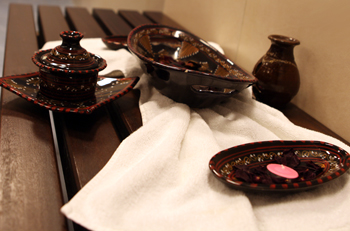 2014 or the possible Hyatt Regency a mile away. “We are more of an exclusive hotel. We aim to provide whatever the customer wants. We are not as fast paced as the larger hotels as we are a boutique hotel. We pay attention to detail and to the customer, attending to their business and leisure needs.”
2014 or the possible Hyatt Regency a mile away. “We are more of an exclusive hotel. We aim to provide whatever the customer wants. We are not as fast paced as the larger hotels as we are a boutique hotel. We pay attention to detail and to the customer, attending to their business and leisure needs.”
Al Waddan is reminiscent of the old houses of Tripoli, situated on four hectares of land. The traditional open courtyard creates an area of serenity with palm trees and shaded areas arranged around a swimming pool. With 90 spacious guest rooms offering either sea, city or pool view Al Waddan aims to become a 6 star boutique hotel, a business hub for the capital and a leisure hub for the locals or international visitors on short trips to Libya.
Four restaurants are planned within the grounds, serving regional and international cuisine; a state of the art fitness and spa centre is almost complete; and within the next two years Tarsin hopes the theatre will also be open: “This is a boutique hotel and we would like to bring back that pleasant life and spirit that it had before.”
In order to achieve this level of quality he feels it is necessary to train local staff, including English classes. 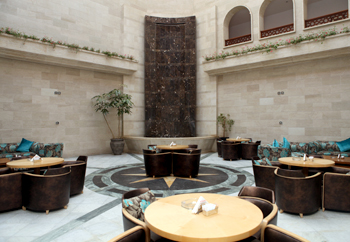 Al Waddan is currently employing hospitality sector professionals from the Philippines to train their Libyan staff and hopes that the government and multinational companies will invest in the local population rather than employing foreign expats in the hotel industry.
Al Waddan is currently employing hospitality sector professionals from the Philippines to train their Libyan staff and hopes that the government and multinational companies will invest in the local population rather than employing foreign expats in the hotel industry.
Located on the Mediterranean Sea with an extensive coastline, pleasant climate and a rich history, there are high expectations for growth in Libya’s tourist industry. Once the government establishes itself the multinationals can start investing money, time and expertise.
“I think that from this point we are moving forward. If Libya reintegrates itself into the global village and locally integrates the Libyan people and youth, I think Libya will prove to be a very successful and prosperous country,” concludes Tarsin.